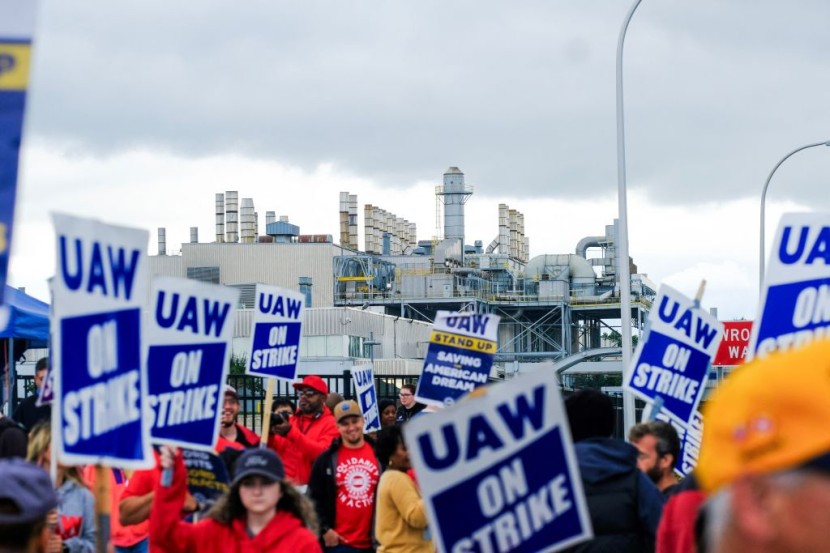The United Auto Workers (UAW) strike, now in its fifth week, is sending shockwaves through the automotive industry as UAW President Shawn Fain warns of the potential for more walkouts at US truck and SUV factories.
The central issue is the demand for improved wage and benefit offers, with Fain insisting that the Detroit Three automakers can afford more than what's currently on the table, as per Reuters.
UAW's Detroit Strike

Fain declared, "We're striking the Big Three like we've never struck before," highlighting the union's determination to push for better terms. He argued that these highly profitable automakers can offer more to their workers.
After weeks of strikes, Fain confirmed that the UAW has received fresh contract offers from General Motors and Chrysler-parent Stellantis in the past 24 hours, while Ford made its most recent offer over two weeks ago. The negotiations have reportedly converged on a 23% wage hike, with progress on other issues.
However, Fain believes there's more to be achieved, even though GM and Ford claim that additional cost-of-living increases push their total compensation offers to over 30%. While some UAW members may want to vote on the current offers, Fain urged them not to succumb to "fear, uncertainty, doubt, and division" that the companies have sowed to weaken the union's stance.
Fain's remarks also conveyed hope, indicating that talks were closing on a resolution. He acknowledged that this strike stage is often the most challenging, with both sides making their final push toward a deal. In response to the developments, shares in GM and Ford saw a 1% increase on Friday, indicating that investors were cautiously optimistic about the progress in negotiations.
The UAW initially opened bargaining with a demand for a substantial 40% wage hike. The strikes began on September 15, and more than 34,000 union members are now simultaneously engaging in the UAW's first-ever strikes against all three of the Detroit Three automakers.
Last week, the UAW surprised the industry with a strike at Ford's Kentucky Truck Plant, which generates $25 billion in annual sales. Fain described this move as a warning to GM and Stellantis, and it has since added more pressure on the automakers.
Ford, which has presented the most generous offer among the three companies, has stated that it is at the limit of what it can pay while remaining competitive, according to AXIOS.
Read Also: PM Rishi Sunak Overhauls UK Departments Amid Rough First 100 Days
UAW-Ford Conflict Impacts EV Future
One of the striking elements of Fain's remarks was his tough stance towards Ford, notably Bill Ford, the company's chairman and great-grandson of the founder, Henry Ford. Ford had maintained a collaborative relationship with the UAW for decades as a competitive advantage against GM and the former Chrysler, now part of Stellantis.
Fain declared that "the days of the UAW and Ford being a team to fight other companies are over."
He pointed to Ford's $600 million fourth-quarter dividend, suggesting that it would amount to a dollar-an-hour raise for all Ford hourly workers throughout a new contract. Fain accused Ford of having the resources but was unwilling to share them with the workers.
The automakers have argued that the union's demands would significantly raise costs and hinder their electric vehicle ambitions. Electric vehicle leader Tesla and foreign brands like Toyota need to be more unified. Ford responded to Fain's statements by expressing its eagerness to conclude the negotiations.
The company highlighted the lost wages and profit sharing experienced by its workers during the strike. Stellantis, on the other hand, declined to provide an immediate comment regarding the matter. Meanwhile, Bill Ford has cautioned that the ongoing strike is taking a toll on the automaker and the US economy.
An economic consultancy estimated that the total financial losses from the strike had reached $7.7 billion, with the Detroit Three automakers accounting for $3.45 billion. It is worth mentioning that Fain did not address the topic of the electric vehicle battery plants that Ford intends to construct in collaboration with Asian battery manufacturers.
These specific details have yet to be resolved within the UAW master agreement. The UAW advocates for worker organization and a significant wage increase, especially for workers whose current pay rates are lower than assembly plant pay scales. The outcome of these negotiations will have important implications for the automotive industry and the future of labor relations in the sector, Wish TV reported.
© 2026 HNGN, All rights reserved. Do not reproduce without permission.








